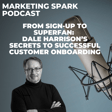
Content That Connects: Erin Balsa on AI, Authenticity, and Standing Out
In this episode of the Marketing Spark Podcast, content marketing strategist and founder of Haus of Bold, Erin Balsa, takes us behind the scenes of her journey from early marketing days to becoming a freelance powerhouse.
We dive into the evolving role of AI in content creation, uncover strategies to break through the digital clutter, and talk about the importance of consistency—without sacrificing creativity or risking burnout.
Erin shares her go-to methods for smashing writer’s block, offers fresh perspectives on thought leadership and brand voice, and reveals how she measures success beyond clicks and likes.
Finally, she looks ahead to what content marketing might look like in 2025 and offers the one skill that marketers need to own the future.
If you’re hungry for practical tips, big-picture insights, and a spark of inspiration, this episode is a must-listen!



















